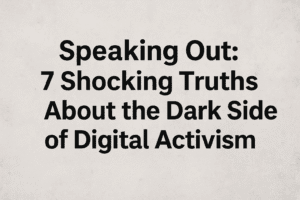Speaking Out: 7 Shocking Truths About the Dark Side of Digital Activism
Social media creates relentless pressure to publicly condemn atrocities like those in Gaza, framing silence as complicity. Yet this demand often reduces moral expression to performative recitations of tribal scripts—”genocide” or “October 7th” must be cited rigidly to gain entry into ideological circles. Sincerity becomes secondary to conformity, diluting genuine courage (like Greta Thunberg’s) into low-stakes online gestures. Worse, sharing potent symbols—like Pastor Niemöller’s Holocaust-era poem—creates an illusion of impact, mistaking viral posts for meaningful resistance.
For many, speaking out risks profound personal consequences (careers, relationships) while achieving negligible political change, highlighting an absurd gap between sacrifice and efficacy. True moral voice requires rejecting hollow performativity: strategic timing, substance over slogans, and actions beyond posts. Speaking matters, but only when it carries weight beyond the noise.

Speaking Out: 7 Shocking Truths About the Dark Side of Digital Activism
The impulse hits like a reflex: See horror, post condemnation. In our hyper-connected world, witnessing atrocities like those in Gaza, the West Bank, or the escalating Israel-Iran conflict triggers an almost automatic pressure to “speak out.” Social media transforms us into instant pundits, our feeds a cacophony of denunciations, tributes, and solidarity statements. But what does this ritual actually mean? Is hitting “share” on Pastor Niemöller’s haunting “First they came for…” the same as embodying his courageous stand?
The Pressure Cooker of Public Speech
The modern public sphere operates on an unspoken mandate: silence equals complicity. From both pro-Palestinian activists demanding we “never stop speaking about Gaza” to pro-Israel voices insisting on constant remembrance of hostages and denunciation of antisemitism, the message is clear: You must speak, and you must speak correctly. This pressure, however, creates a dangerous paradox:
- The Sincerity Trap: When speech is demanded, how can we know our words are truly our own? The constant drumbeat to perform outrage can pollute genuine feeling, turning moral expression into a calculated entry fee for specific ideological tribes.
- The Conformity Mandate: Nuance dies at the altar of purity tests. You must call it “genocide” or reference “October 7th” precisely. Discourse becomes recitation, not reflection. Authentic, uncertain voices (like Dawn French or Gary Lineker’s attempts) get lost, punished for lacking the cynical precision the online arena demands.
- The Illusion of Equivalence: Sharing a powerful quote like Greta Thunberg’s call to “fight for a free Palestine” feels brave. But does the courage of the original speaker truly transfer to the thousandth sharer? Social media flattens risk, making profound personal sacrifice indistinguishable from low-stakes online performance.
The Question of Impact: Does Speaking Out Actually Change Anything?
The underlying assumption is clear: collective voices move mountains. We invoke historical silences that enabled genocide, believing our loudness prevents recurrence. Yet, history is also littered with ignored martyrs and failed movements. The sheer ease of speaking out today fundamentally alters its potential power:
- The Chorus of Narcissism: When everyone shouts, no single voice cuts through. The deluge of online statements creates noise, not leverage. The idea that our individual tweet is part of a decisive wave often ignores how real power operates – frequently silently, behind closed doors.
- Mistaking Voice for Action: Sharing Niemöller’s words is easy; living his resistance is hard. Social media conflates expression with efficacy. Posting becomes a substitute for the harder, less visible work of organizing, donating, pressuring representatives, or engaging in difficult conversations offline. As the author starkly notes: posting Niemöller doesn’t make you Niemöller.
- The Absurdity Gap: For many, especially those with complex personal or professional ties (like the author navigating Jewish communities), speaking out carries high personal cost (damaged relationships, career risks) but offers low political impact. This gap – sacrificing much for negligible change – feels absurd, paralyzing genuine moral expression.
Reclaiming the Weight of the Voice
So, is silence the answer? Not necessarily. The critique isn’t against speaking out in principle, but against its performative, hollowed-out digital form. To reclaim the voice’s potential requires:
- Valuing Scarcity Over Saturation: A voice gains power when it’s not lost in the crowd. Choosing when and how to speak strategically, ensuring it lands with impact, matters more than constant, obligatory noise.
- Prioritizing Substance Over Performance: Move beyond reciting catechisms. Offer analysis, context, personal reflection, or calls to concrete action. Challenge your own tribe’s orthodoxies. Sincerity, even when imperfect, holds more value than flawless conformity.
- Recognizing Voice as Part of Action, Not Its Substitute: Use speech to mobilize tangible support, educate, or challenge power structures directly. Link your words to offline efforts – donations, protests, voter drives, community building. Understand that speaking is one tool, not the entire toolbox.
- Embracing the Power of Listening: True understanding, essential for effective action, requires listening more than speaking – especially to those directly affected, even when their narratives challenge our own. Build spaces for dialogue, not just monologue.
The Hard Truth
Speaking out against atrocity remains a moral imperative. But in the age of instant, performative outrage, we’ve cheapened the currency. Real moral voice isn’t measured in likes, shares, or adherence to dogma. It’s measured in the courage to speak meaningfully when it counts, the willingness to risk something real beyond online friction, and the understanding that true impact often requires more than a post – it demands strategy, sacrifice, and action that resonates beyond the digital echo chamber. The challenge isn’t just to speak, but to ensure our speech carries the weight it deserves.
You must be logged in to post a comment.